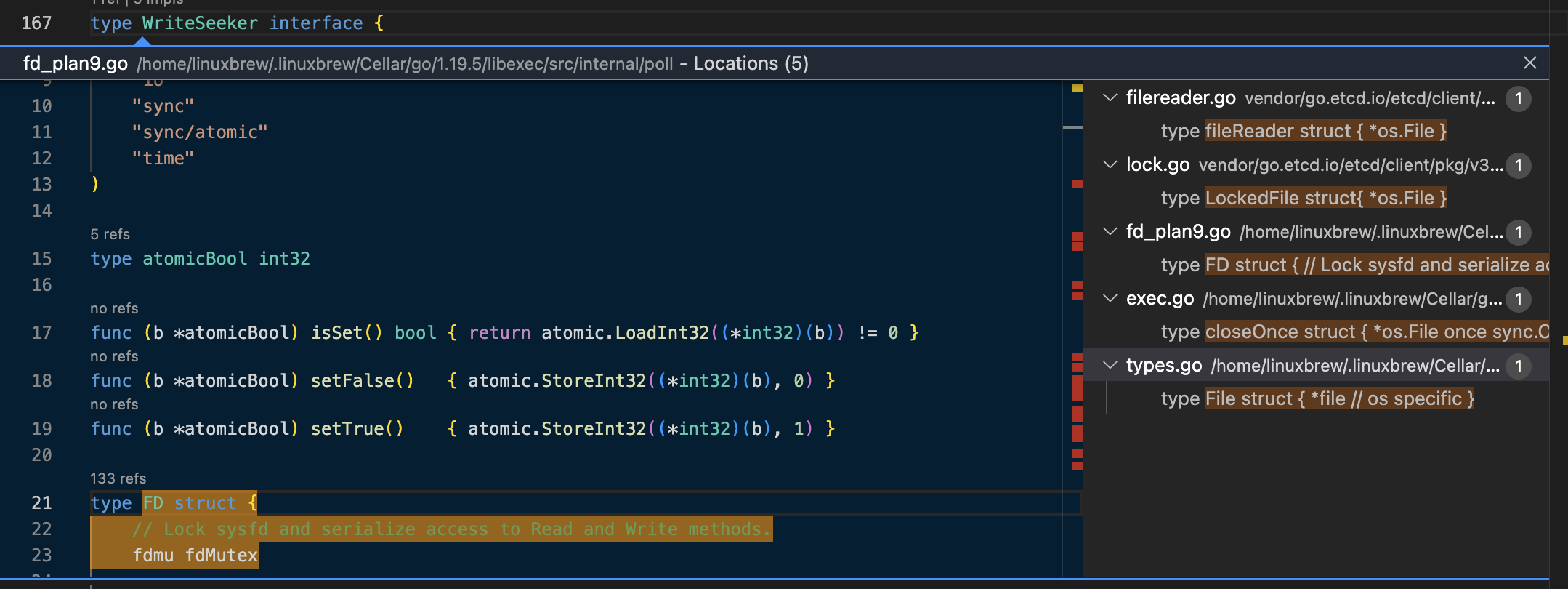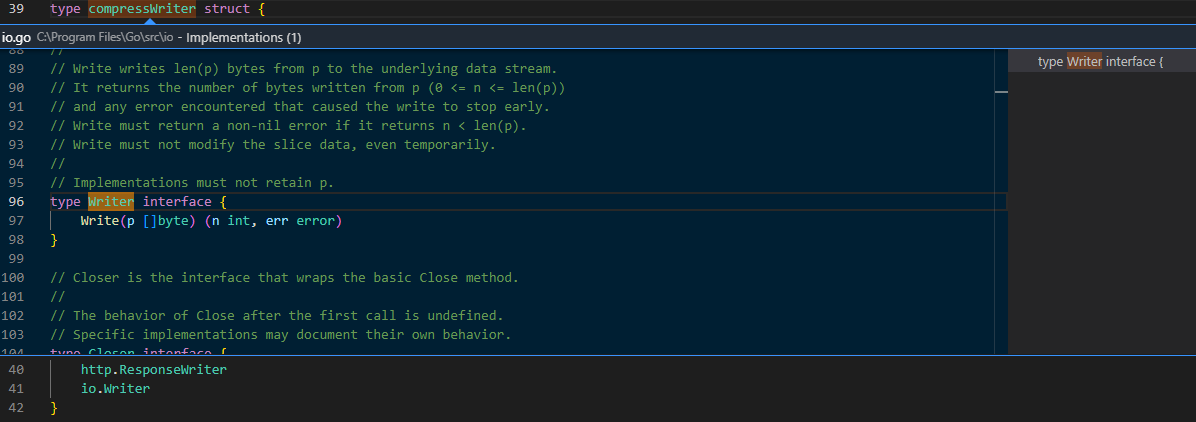-
Notifications
You must be signed in to change notification settings - Fork 18k
x/tools/gopls: very poor quality of finding implementations feature #57898
New issue
Have a question about this project? Sign up for a free GitHub account to open an issue and contact its maintainers and the community.
By clicking “Sign up for GitHub”, you agree to our terms of service and privacy statement. We’ll occasionally send you account related emails.
Already on GitHub? Sign in to your account
Comments
|
Thank you for the report. We will investigate (for starters, we should bisect the regression). CC @adonovan who is working on implementations currently. This may be related to recent changes in master. |
|
As chance would have it, we just merged a new implementation of 'implementations' this morning, and I tried it on the example in your bug report.
I compared it to v0.11.0, and it gave essentially the same answers to all three queries, except that v0.11.0 returned an additional 2 elements in query number 3, for a total of 9. The additional ones were: Both of these are function-local type declarations, which are only reported by the new algorithm if they appear in the same package as the query type. In this case, they do (specifically, a test variant), so that's another regression. So your example has uncovered one bug in old and new algorithms, and one regression in the new algorithm, both of which I will fix. But I can't reproduce the specific problem you mention about embedSomeStruct not having any implementations. (I'm using Emacs+eglot as my LSP client, but I don't think that should matter much.) Also, could you provide more information about compressWriter? I can't see the declaration of that type in your screenshot, nor does it appear to be part of jwt. Thanks. |
It's under that wide popup with type compressWriter struct {
http.ResponseWriter
io.Writer
}
// In case if it matters, that's the only method which redeclares Write:
func (cw *compressWriter) Write(b []byte) (int, error) {
return cw.Writer.Write(b)
} |
|
Change https://go.dev/cl/462658 mentions this issue: |
Ah, so it is! I had assumed it was occluded by the popup, bit it was merely displaced downwards.
It does matter. Without this method, compressWriter would not satisfy the Writer interface because it would be ambiguous which of the two Write methods (one from each field, each at the same embedding depth) should "win". The explicit method essentially resolves in favor of "the second". I tested the compressWriter example using three versions--the new implementation of 'implementations', the previous one from earlier this week, and the v0.11.0 release--and it correctly reports a result of two elements, ResponseWriter and Writer. So unfortunately I'm not able to reproduce the failure yet. |
On closer inspection, the example_test.go file is in a different package--witness the package's |
|
@findleyr and I just observed the correct behavior on the compressWriter example using VS Code, so that issue remains elusive. If you're able to provide any more details that might help us reproduce it, I'd be happy to fix it. Otherwise I plan to close this issue when https://go.dev/cl/462658 is merged. Thanks again. |
Previously, the operation on struct{T} would fail with the error
"T is a var, not a type".
I don't like the way that each new testcase in the marker tests
incurs a quadratic logical complexity. Convenient though it is
to edit testdata/*.go files, it tends to encourage a kind of sprawl.
Do we have a precedent for self-contained marker tests that use
a txtar literal?
Updates golang/go#57898
Change-Id: I39a5cb1d96452b621bc6661094f1d735f0e32d3f
Reviewed-on: https://go-review.googlesource.com/c/tools/+/462658
Run-TryBot: Alan Donovan <adonovan@google.com>
TryBot-Result: Gopher Robot <gobot@golang.org>
gopls-CI: kokoro <noreply+kokoro@google.com>
Reviewed-by: Robert Findley <rfindley@google.com>
|
We will get to the bottom of this. |
|
@inliquid In our extension we have an alternative implementation of finding implementations. You could try it by installing from here: https://marketplace.visualstudio.com/items?itemName=tooltitudeteam.tooltitude Note: you need to use code lens to find usages, not shortcut for it to work. We work as an augmentation for gopls, so we need to work in this way. |
|
@tooltitude-support while we welcome additions to the Go tools ecosystem, this issue is about a bug in gopls. Advocating for an alternative does not help us fix the bug. Please refrain from such comments in the future: they are not constructive, and in fact may be counter-productive if they distract from root-causing the bug in question. Furthermore, it makes me uncomfortable that users may be directed from this issue to (what appears to be) a closed-source extension. Do you publish your source code anywhere? You are of course welcome to suggest solutions to the problem here, based on your experience writing your extension. |
|
@findleyr Ok, I am sorry for the comment and that it distracts from the fixing of the issue. The extension is closed source and we don't have plan to open source it. However, I don't think it's completely counter productive. Having two implementations of the same functionality allows us to compare the results, and try to find the place where the issue reproduces. Concerning the issue, I could add that I tried the results of our search compared to gopls search, and in all cases where I tried, they were consistent, i.e. all derived types were the same. There was a difference in library types, but I guess, that we collect results here differently. We are more aggressive in collecting files with non current build tags. Also, feel free to do the same on some projects, in this way you might find inconsistencies, though, I tried hard to find at least one of them and failed at it. Maybe @inliquid could try doing the same. |
|
@findleyr Concerning the projects, I tried, they were k8, and esbuild. k8 is a bit outlier since most of the dependencies are vendored. Esbuild, doesn't have that many interfaces. |
|
@findleyr Actually, I looked into library files on k8. Here's comparison of usages of io.WriteSeeker: You miss closeOnce from exec.go which implements io.WriteSeeker via inclusion of os.File (we miss file from fd_unix due to attempt to load all tags). |
|
@tooltitude-support thank you for investigating, and for the screenshots. |
Without wishing to prolong this off-topic discussion, I think you @tooltitude-support would do well to recognize that it is not reasonable in 2023 to ask developers to install closed-source software from unknown organizations. Open source software such as Chrome, Emacs, Bash, GNU, or gopls allows a vigilant community of users to provide some collective (if imperfect) assurance that the software is not malicious. Closed-source software doesn't enable scrutiny of the code, but vendors (e.g. Apple, JetBrains, Adobe) may nonetheless demonstrate a good track record for security, and they risk losing customers and income when they screw up. Tooltitude is closed source, not affiliated with a reputable organization, and, as far as I can tell, is the work of a single person. As a result it would be foolish of me to run your code on my machine. For all I know, the entire project could be a ruse to steal SSH keys from Go developers. I'm pretty sure that's not your intent, but I can't really be sure. As @findleyr said, we welcome better tools for the Go ecosystem, but we also encourage secure development practices. Your users shouldn't have to choose between them. |
We develop software in a secure way using best practices. We intend to be a trusted software vendor, and not a criminal enterprise. It's pretty disappointing to hear this gross description from you instead of just mentioning that you don't trust us enough to install the software. P.S. If you don't trust software enough, you could always run it in a VM, either on your computer or in the cloud. |
Perhaps I'm unusual, but there are in fact very few closed-source programs on my (actually Google's) developer machine: only Spotify and macOS itself. Google's sysadmins may have installed more, but I trust them. (My personal phone is a different story, but mobiles have a different capability model that doesn't make it so trivial to exfiltrate any file).
I could, but that's a pretty big disincentive to adoption. And I'd still be trusting your program with the privacy of my source code.
To be clear, I don't actually believe you have any malicious intent; I was just inviting you to put yourself in the shoes of your more skeptical and security conscious users at a time when vulnerabilities are always making headlines.
Sorry, I'm not much of a business person, and I don't have any good ideas for how to cross the chasm between enticing users with an early product and running a mature trustworthy business that sells closed developer tools (such as JetBrains, Sublime). Developer tools has always been a tough business because so much is free. Best of luck though. Thanks for reporting the gopls bug. It is much appreciated. |
|
@adonovan Thanks for your answers! Really appreciate your feedback!
Thanks a lot! P.S. Will stop the discussion to stop off-topic. |
|
@tooltitude-support, I can't reproduce the closeOnce problem using gopls@master, go@1.19.5: @inliquid: I can't reproduce the GreeterServer issue by using @inliquid: The built-in error interface is a special case that is indeed not supported. I'll file a separate issue for that one. I'm going to close this issue. Please file a new issue if you still believe any of these problems (or others) exist at master, as this issue refers to a number of separate problems. |




gopls version
gopls@master (most recent)
go env
What did you do?
In recent versions I start noticing that
goplscan't find that some struct implements an interface or, in reverse, that there are implementations of some interface. This didn't happen before and looks like regression.For example this

compressWriterimplementshttp.ResposeWriterbecause it embeds it, but it's not shown:In this example,
goplsdoesn't see embeddedjwt.RegisteredClaims(fromgithub.com/golang-jwt/jwt/v4) struct, which in turn implementsjwt.Claims:Same happens when I try to find implementations of a particular interface.
What did you expect to see?
Find "interfaces implemented by a struct" and "structs which implement an interface" feature finds all relevant objects/interfaces.
What did you see instead?
Sometimes it works, sometimes it doesn't. This inconsistent behavior creates quite negative user experience and leads to mistakes in code.
The text was updated successfully, but these errors were encountered: